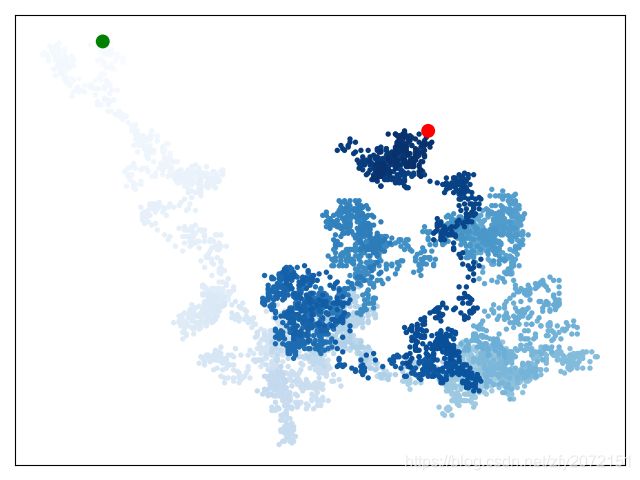Python 项目二 数据可视化
一、生成数据
1.安装matplotlib
用的pycharm编译器 直接在pycharm中安装即可
file-settings-project interpreter+matplotlib
2.绘制简单折线图
import matplotlib.pyplot as plt
input_values=[1,2,3,4,5]
squares = [1,4,9,16,25]
plt.plot(input_values,squares,linewidth=5)
#设置图标标题 并给坐标轴加上标签
plt.title("Square number",fontsize =24)
plt.xlabel("Value",fontsize=14)
plt.ylabel("Square of Value",fontsize=14)
#设置刻度的大小
plt.tick_params(axis="both",labelsize=14)
plt.show()
import matplotlib.pyplot as plt
x_values=list(range(1,1001))
y_values=[x**2 for x in x_values]
#plt.scatter(x_values,y_values,edgecolor ="none",c=(0,0,0.2),s=40)
#s设置点的尺寸,c设置线条颜色"red"或者RGB模式,制定原则(0,0,0.2)颜色越接近0越深。默认蓝色的 点和黑色的轮廓,需要删除黑色的轮廓
plt.scatter(x_values,y_values,edgecolor ="none",c=y_values,cmap=plt.cm.Blues,s=40)
plt.title("Square number",fontsize =24)
plt.xlabel("Value",fontsize=14)
plt.ylabel("Square of Value",fontsize=14)
#设置刻度标记大小
#plt.tick_params(axis="both",which="major",labelsize=14)
#设置每个坐标轴的取值范围
plt.axis([0,1100,1,1100000])
#plt.show()
plt.savefig("squares_plot.png",bbox_inches="tight")
创建RandomWalk 类
from random import choice
class RandomWalk():
'''一个生成随机漫步数据的类'''
def __init__(self,num_points=5000):
'''初始化随机漫步的属性'''
self.num_points=num_points
#所有随机漫步数据都开始于0,0
self.x_values=[0]
self.y_values=[0]
def fill_walk(self):
'''计算随机漫步包含的所有点'''
#不断漫步,直到列表到达指定长度
while len(self.x_values)画图 随机漫步并设置样式
from random_walk import RandomWalk
import matplotlib.pyplot as plt
while True:
# 创建一个randomwalk实例,并绘制出图形
rw = RandomWalk(5000)
rw.fill_walk()
point_numbers = list(range(rw.num_points))
plt.scatter(rw.x_values, rw.y_values,c=point_numbers,
cmap =plt.cm.Blues,edgecolor="none",s=15)#使用颜色映射来指出漫步中个点的先后顺序
#突出起点和终点
plt.scatter(0,0,c="green",edgecolors="none",s=100)
plt.scatter(rw.x_values[-1],rw.y_values[-1],c="red",edgecolors ="none",
s=100)
#隐藏坐标轴
plt.axes().get_xaxis().set_visible(False)
plt.axes().get_yaxis().set_visible(False)
#设置绘图串口的尺寸
plt.figure(dpi =128,figsize =(10,6)) #函数figure()用于指定图标的宽 高 分辨率和背景颜色。
plt.show()
keep_running =input("make another walk?()y/n: ")
if keep_running == "n":
break


